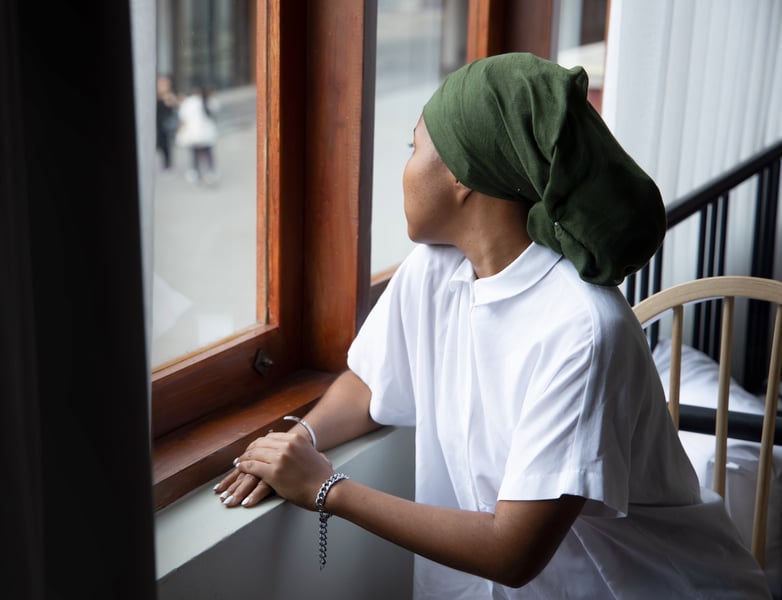Get Healthy!

- Cara Murez
- Posted April 14, 2023
Black Cancer Patients Much More Prone to Chemo-Linked Heart Trouble
Sometimes cancer, and the treatments meant to eradicate it, can damage the heart and blood vessels. Now, a new analysis finds that damage may be much more likely if the patient is Black.
Black patients had 71% higher odds of developing what is known as cardiotoxicity following chemotherapy when compared to white patients. They also had increased odds of being diagnosed with congestive heart failure.
This doesn't mean Black cancer patients shouldn't get the cancer treatment they need, stressed lead study author Wondewossen Gebeyehu, a medical student at the University of Toronto.
"We definitely advise all patients, regardless of race, to seek appropriate cancer treatment and therapies as recommended by clinicians,"Gebeyehu said. The review is "more an investigation into how we can best help Black patients throughout the process of cancer treatment to try to address these disparities."
The research is scheduled for presentation Friday at an American College of Cardiology conference in Washington, D.C. Findings presented at medical meetings should be considered preliminary until published in a peer-reviewed journal.
A review published online in December 2020 in the journal Cancers summarized how cancer treatments can damage the heart, noting that cardiotoxicities linked to cancer treatments include cardiomyopathy (heart disease), atrial fibrillation (irregular heartbeat), arterial high blood pressure and myocarditis (heart inflammation).
A number of different therapies were implicated, including radiation, treatments directed at certain breast cancers, anthracyclines, fluoropyrimidines, platinums, tyrosine kinase inhibitors and proteasome inhibitors, immune checkpoint inhibitors, and chimeric antigen-presenting (CAR)-T cell therapy.
In his review, Gebeyehu screened more than 7,000 studies from several databases before honing in on 24 studies representing nearly 684,000 participants.
This is not the only health care area where significant disparities exist for Black patients. Although it's difficult to point to a specific cause, there are a number of possible reasons, including socioeconomics and systemic racism, Gebeyehu said.
"We also know that Black and African American patients are often underrepresented in clinical trials for drug development. One has to wonder whether that could play a role in cancer treatment, drugs being optimized in patient samples where Black patients are underrepresented and thus the agents are not optimized to effectively treat Black patients' cancers with low levels of side effects or complications,"Gebeyehu said.
It is important to continue developing and maintaining trusting relationships between Black patients and clinicians, Gebeyehu said.
"The findings really emphasize a need for a more specific initiative to try to address these inequities I think at multiple levels, both in drug development and clinical trials, as well as in clinical practice,"Gebeyehu said.
Dr. Janet Wei, a cardiologist in the Smidt Heart Institute at Cedars-Sinai in Los Angeles, noted existing racial disparities in both cancer outcomes and in heart risk factors.
"When you already have preexisting racial disparities in outcomes for cancer itself as well as with cardiovascular risk factors, I think it makes a lot of sense why the conclusion of this abstract found such high -- 71% -- increased odds of cardiotoxicity,"said Wei, who was not involved with the study.
Although the review is preliminary, it would be interesting to see specific potential contributors after it is published in a medical journal, Wei said, including whether the studies reviewed controlled for socioeconomic status, gender or geography.
"That, I think, would help us try to pinpoint a little bit more how we try to reduce these disparities,"Wei said.
Recognizing that these disparities exist is important, Wei said, and could lead to a screening protocol and focusing on heart-healthy behaviors during cancer treatment.
"There are now studies that indicate that certain types of medical therapy can help prevent chemotherapy-related cardiotoxicity,"Wei said. "I think keeping that in mind also will hopefully lead to more initiation of these types of potentially protective therapies."
The medical community will need to be more proactive and to take the time to counsel Black patients about why their doctors may be recommending certain therapies to help protect long-term heart health, Wei said.
"It really is a public health crisis because we are seeing these racial disparities in cardiovascular disease, in pregnancy outcomes. This is not surprising that we're seeing this disparity also in cardio-oncology,"Wei said.
More information
The U.S. National Cancer Institute has more on cardiotoxicity.
SOURCES: Wondewossen Gebeyehu, BSc, medical student, University of Toronto, Canada; Janet Wei, MD, cardiologist, Smidt Heart Institute, Cedars-Sinai, Los Angeles; American College of Cardiology's Advancing the Cardiovascular Care of the Oncology Patient conference, April 14 to 16, 2023, Washington, D.C.





